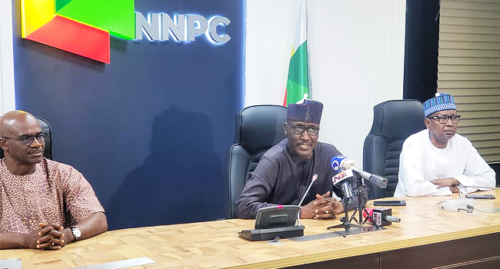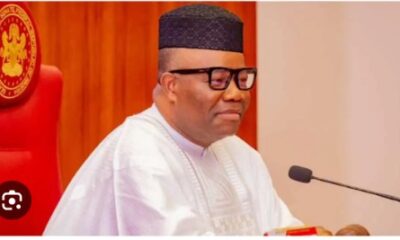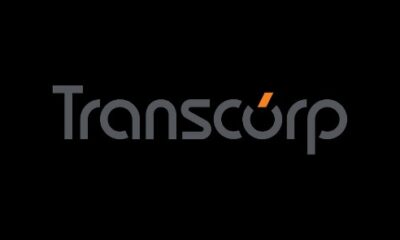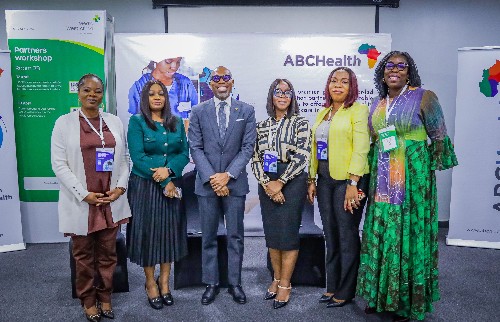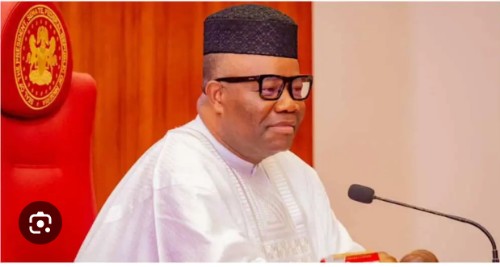The local production of Premium Motor Spirit, otherwise known as petrol, by Dangote Refinery, Port Harcourt Refining Company and others in Nigeria is not going to change the pump price of the commodity, the Nigerian National Petroleum Company Limited has said.
The NNPCL’s Group Chief Executive Officer, Mele Kyari, who disclosed this during an interview on Arise television in Abuja on Thursday, stressed that the notion that petrol prices would reduce once the country starts domestic production was false.
Kyari confirmed that the Dangote Refinery, which was inaugurated on May 22, 2023, by former President Muhammadu Buhari, would start pushing out products by the end of July and early August.
He also stated that the Port Harcourt Refinery would be delivered by the end of the year, adding that the facility was expected to further boost local production of petrol.
But Kyari declared that despite the volume of petrol being expected from these facilities, the cost of the commodity would not reduce, regardless of the fact that the product was produced locally.
“There is a notion that if the product is processed locally, prices will reduce. Let me make it clear that it is not going to change anything. If you produce locally, the refineries will also input the cost of production and other things and it will be sold at the current price.
“There will also be no subsidy when local production starts because there is no cash-to-back subsidy, this country no longer has the resources to continue with subsidy,” Kyari stated.
Fuel queues
Speaking on when the fuel queues being witnessed across the country would clear, during another interview on Channels TV, the NNPCL boss said the queues would not exceed Saturday.
“I don’t see it staying beyond another day or two, maximum. It can actually be on Saturday. We have supplies. The key trouble with the PMS system is supply, but I have supplies.
“There are over 810 million liters of PMS in depots, tanks, and fuel stations across the country, so you don’t have the problem of transferring those from marine to land, you already have them on the ground,” he stated.
He validated the PMS pricing document for various states that trended on Wednesday on the internet, stating that the document was from the NNPCL.
“You have seen a document in the space out there. Every company does this. It is a marketing document. It was not a price announcing document, every company keeps this record and adjusts it appropriately on the basis of changing conditions in the market.
“So what you saw was just an internal company document that found its way into the internet. It is an NNPC document but it was not intended to be an announcement and is not an announcement, because it can change the next day,” Kyari stated.
On whether there was enough product in-country, he said, “Today I have 1.8 billion liters of PMS and that means that if we don’t do anything, I’ll have sufficient fuel for the next 30 days in my hands.
Kyari explained that the company had over 800 million liters of petrol on land, stored in filling stations, tank farms, and depots, while its total stock for both marine and land stood at about 1.8 billion liters.
“But, of course, the way we supply is not this way, so we maintain this level of supply consistently. That means you will see the arrival of products every day so that you continue to maintain that level of safety.”
‘Subsidy not realistic’
Speaking to journalists after a meeting with the National Chairman of the All Progressives Congress, Senator Abdullahi Adamu, at the party secretariat in Abuja on Thursday, Kyari revealed that the administration of President Bola Tinubu had concluded arrangements to have one of the four refineries repaired and operating at an optimal level before the end of the year.
The NNPCL boss argued that it was no longer justifiable to continue subsidizing the commodity given the high opportunity cost the Federal Government was suffering from funding it.
Kyari, who was received by the APC chairman and members of the National Working Committee at about 12.30 pm, confessed that the country could no longer sustain the expensive subsidy regime.
According to him, over 38 percent of the total fuel distributed in the country was consumed by Lagos, Abuja, Kano, and Rivers.
Kyari explained that following the hike in pump price and the resultant effect on commercial fare, the president was working out some palliative measures to ease the pains of Nigerians.
He also added that there was an ongoing process of rehabilitation to ensure one of the refineries was ready this year.
Kyari lamented that despite its N2.8tn indebtedness to the NNPCL, the Federal Government had yet to release funds for 2022 and 2023 subsidies.
He said, “There was a subsidy in 2022 but in 2023, not a single naira was provided for the purpose. And ultimately while we held back our fiscal obligations, we still have a net balance of over N2.8tn that the federation should have given back to the NNPC.
‘’For any company, when you have negative N2.8tn, there is no company in the whole of Africa that will lend to you. You cannot have receivables. The provision of subsidy is there but absolutely there is no funding for it. It means it is only on paper. It doesn’t exist.
“We can no longer bear it. If we continue, we will run into defaults and the default of NNPC is the default of Nigeria. Once NNPC goes into default and liquidity, it affects every borrowing done by the country, even the sub-nationals. Your lenders will come back to you and say your country can no longer pay.
‘’The only way you can stop this is to stop this conversation around subsidy. It is why Mr. President announced that the subsidy is gone. In 24 hours, the bond market appreciated. It is nothing else other than the statement around subsidy and balancing of the apex market. These two elements are a major concern for every investor all over the world. Every partner that we have is worried about.’’
Inflation expected
Kyari acknowledged that the price increase would trigger inflation, noting that the market forces would determine what happens subsequently.
He noted, “Before today, the average subsidy level was N400bn every month. There is nothing anybody can do about it. There is this common argument that the masses will suffer. I agree that once you increase prices of this proportion, as it has happened, it will have an impact on inflation. There is no doubt about it. The market determines what happens next. Even inflation in many countries goes up when you have economic indices become difficult.
“Mr. President’s target is to have seven percent growth of GDP. You cannot have it if you have this disruption in your demands and consumption pattern. Very many of us here have at least two cars in our houses including myself. When you buy fuel of 100 liters in an SUV, you are literally subsidizing three liters with N100 for all of us.
‘’Even the consumption itself is clearly skewed in locations and states where the level of economic activities are higher than the others. It is very understandable and that is why people can afford it in Abuja, Lagos, Port Harcourt, and Kano. So over 38 percent of the total fuel distributed in this country ends up in these places. All the other parts of the country suffer for it and you can see the relativity.’’
Kyari submitted that the price at which petrol was being sold now is the current market price of the commodity.
‘’The price you are seeing today at our stations is the current market price of the commodity and what this means is that prices in the market can go down at any time and the market will adjust itself. The beauty of this is that there will be a new entrance because oil marketing companies now will want to invest, they have been reluctant to come in because of the subsidy,’’ he stated.
With the latest development, the NNPCL chief said the market would regulate itself, adding that oil marketing companies could now import products or buy locally-produced ones and take them into the market and sell at commercial prices.
He added, ‘’You would see competition even with NNPCL, and by law, the company can’t do more than 30 percent of the market going forward. So competition will surely come in and definitely, the market will regulate the price itself. It is an instantaneous price and in two weeks, you will see the adjustment that is happening in many jurisdictions.
‘’But ultimately, you would see changes in price downwards and that is very likely. Efficiency will come in and every lacuna in the sector will be taken out because of the new situation.
‘’The current price is not fixed and will surely change and we did it to announce various prices depending on our cost by location and by the realities around us knowing full well that the NNPCL is the single supplier of the market today and we are seeing that exit coming very quickly. There will be no monopoly and we will not continue to be the only supplier.’’
Meanwhile, the House of Representatives has called on the Federal Government to end subsidies on not just petrol but all petroleum products.
The House, however, urged the government to roll out palliatives and other measures to cushion the effects of the removal of the PMS subsidy on Nigerians.
These were part of the recommendations by the House Ad Hoc Committee on the Need to Investigate the Petroleum Products Subsidy Regime in Nigeria, which the lawmakers considered as a Committee of the Whole and adopted in plenary on Thursday.
Chairman of the committee, Ibrahim Aliyu, had laid the report, 11 months after the task was assigned to the panel.
The committee recommended that “the Federal Government should remove subsidies on all petroleum products.”
It also recommended that “the Federal Government should immediately design measures and palliatives to cushion the effects of the subsidy removal for Nigerians, effective from this year 2023, through the provision and procurement of Compressed Natural Gas buses as an alternative transport system with cheaper fuel consumption.”
The panel also said the government should introduce intermodal, regional, and national transport systems to ease the mass movement of people across the country.
In addition, the committee recommended that the Nigerian Midstream and Downstream Petroleum Regulatory Commission should issue stricter and most appropriate regulations as provided in the Petroleum Industry Act to ensure that Nigerians were not short-changed through profiteering.
The lawmakers equally said the Revenue Mobilisation Allocation Committee should lead a reconciliation meeting between the NNPCL, Federal Inland Revenue Service, Joint Venture Contracts, and the NMDPRC on the utilization of their crude entitlements.
The report partly read, “With the total deregulation of the sector, all the agencies involved in crude lifting/security should have a representative with the Nigeria Navy as a lead agency to physically assess and document daily crude production and lifting;
Oil swap
“The committee also recommends that the Federal Government should, as a matter of urgency, liaise with the National Assembly to fashion out critical areas of economic development, in which the additional revenue from the proposed subsidy removal will be appropriately utilized.
“A further investigation, through a forensic audit by the Office of the Auditor General for the Federation, be made to ascertain whether the N413bn borrowed from the Central Bank of Nigeria for subsidy payments was refunded after the passage and assent of the 2015 budget as earlier approved by the President and the report of the Auditor General to be submitted to the House for further legislative action.
“With the subsidy removal, the Federal Government should forthwith suspend all Direct Sales Direct Purchase (oil swap) contracts. NNPCL should act by the provision of the PIA to ensure that the country is not sub-changed in both production, lifting, and sales of crude.
The committee further recommended that the Nigeria Customs Service and the Weight and Measures Department of the Federal Ministry of Industry, Trade and Investment be equipped to ascertain the actual daily crude oil lifting from the country for proper checks and balances.
Another recommendation was that the Nigeria Extractive Industries Transparency Initiative Act, 2007, be amended by the National Assembly to be in tune with global best practices.
The panel further recommended that the National Assembly, especially the House standing or ad hoc committees in the 10th Assembly be saddled with such responsibility to conduct “a full-scale investigation on the defaulting oil companies and MDAs that have not met the expectations of the committee to ascertain their level of involvement or otherwise and further protect the commonwealth of the country.”
The House on June 29, 2022, resolved to investigate payments for subsidy on petroleum products, especially petrol, under the Muhammadu Buhari administration.
The Speaker of the House, Femi Gbajabiamila, had set up the panel whose probe covered 2017 to 2021, with the mandate to report back to the House within eight weeks for further legislative action.
The probe was based on a motion titled, ‘Need to Investigate the Petroleum Products Subsidy Regime in Nigeria from 2017 to 2021,’ which was unanimously adopted after it was moved at plenary by a member of the House, Sergius Ogun.
In a related development, the Nigeria Labour Congress has dismissed reports that it would embark on a nationwide protest against the increase in the pump price of petrol.
In a statement on Thursday, signed by its head of information, Benson Upiah, the congress noted that it would keep the public abreast of its moves.
The union had demanded the reversal of the fuel pump price while a meeting between the labor leaders and the FG deadlocked on Wednesday.
But clarifying its position following speculations about its next move, the congress said, “In as much as we are outraged by this mindless price increase which is intended to bring untold hardship to ordinary Nigerians, we have no plan to start any action tomorrow (today).
“What we do have for now are organ meetings slated for tomorrow, Friday, June 2nd, 2023 to deliberate on the price issue. We promise to keep Nigerians informed on our next line of action after our meetings.’’
In reaction to the fuel price hike, the Edo Civil Society Organisations on Thursday blocked a section of the Benin/Lagos highway in protest against the subsidy removal.
The protest, which was held at different locations in the state, obstructed vehicular movements forcing commuters to trek long distances.
Credit: The Punch
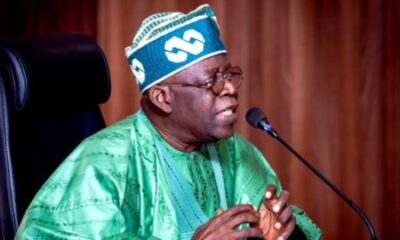
 BIG STORY2 days ago
BIG STORY2 days ago
 BIG STORY2 days ago
BIG STORY2 days ago
 BIG STORY21 hours ago
BIG STORY21 hours ago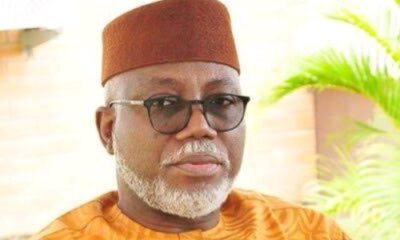
 BIG STORY4 days ago
BIG STORY4 days ago
 BIG STORY4 days ago
BIG STORY4 days ago
 BIG STORY3 days ago
BIG STORY3 days ago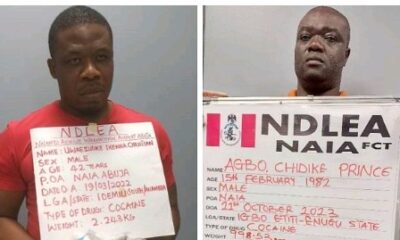
 BIG STORY4 days ago
BIG STORY4 days ago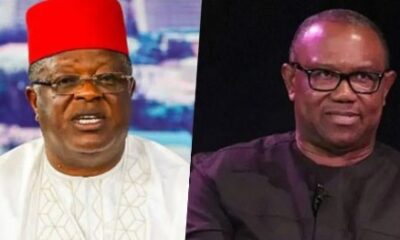
 BIG STORY2 days ago
BIG STORY2 days ago



